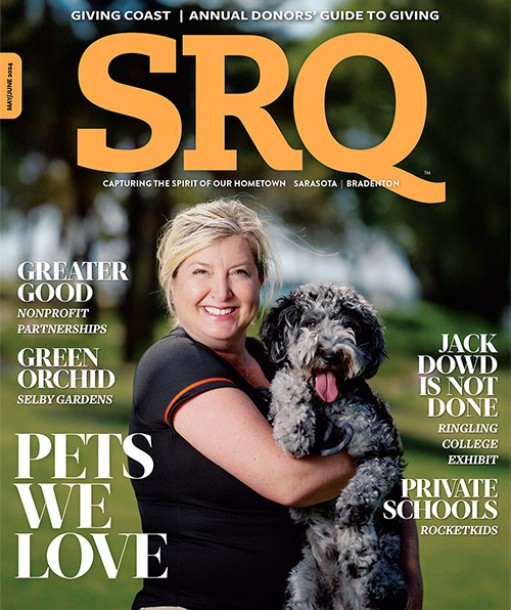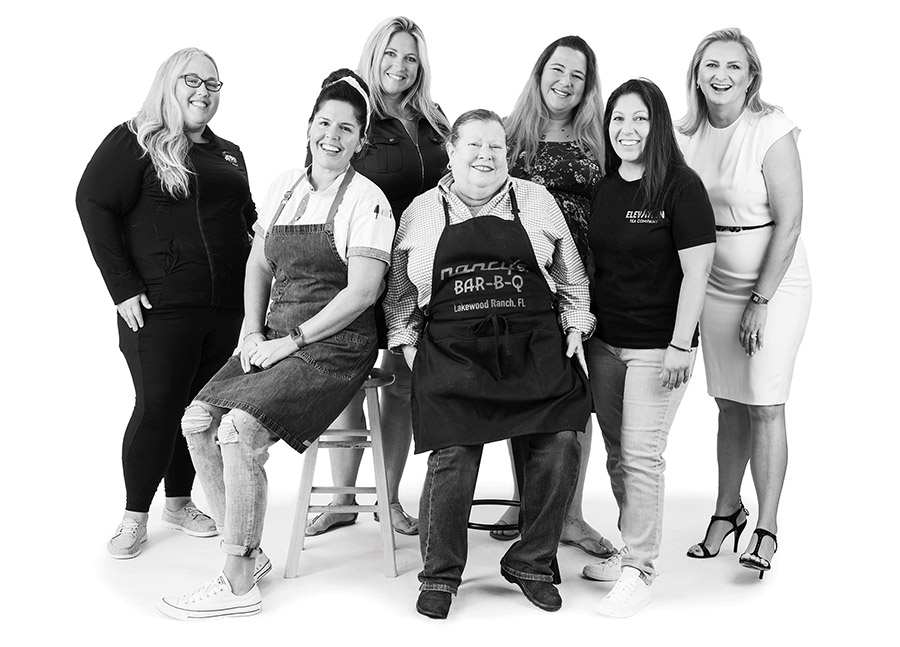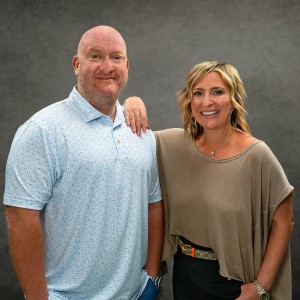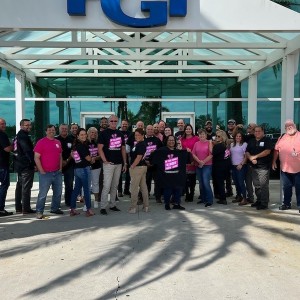If the future is, indeed, female, the Sarasota region's food and beverage industry is in great hands. SRQ Magazine recently hosted a panel discussion with a group of seven prominent women who have staked their livelihood on creating exceptional food and beverage experiences. We sought to bring together a group of powerful, brilliant female entrepreneurs, chefs, and culinary creators at various points in their respective careers, to celebrate their talent and tell their stories. Naturally, this panel represents only a fraction of the women who are shaping the Sarasota/Manatee dining and food and beverage scene. But as you’ll see in the discussion that follows, women in this industry may come to it from disparate paths, but each share a common bond and some similar tales of overcoming adversity to achieve success.
Above, left to right: Christine Nordstrom, Owner, Five-O Donut Co.; Michelle Wolforth,Executive chef, State Street; Jenn Sayko, General Manager, Partner, Chateau 13; Nancy Krohngold, Owner, Nancy’s BBQ; Stefania Fochi, Owner, The Empanada Girl; Jennifer Martinez, Owner, Elevation Tea; Natalia Levey, Founder, Hi Hospitality Group (Speaks Clam Bar, Kojo); photography by Wes Roberts.
How would you characterize the state of Sarasota’s food and beverage scene today, and what do you think it holds for the future?
Natalia Levey, Founder, Hi Hospitality Group (Speaks Clam Bar, Kojo): I think it’s really exciting to see the rejuvenation, because in talking to a lot of people historically, Sarasota used to be a big foodie town. I’m very excited, very optimistic. I’m so happy to see so many more women on the scene and doing amazing things, andI feel like this is the regeneration, rejuvenation of what Sarasota’s dining scene could be. Stefania Fochi, Owner, The Empanada Girl: People are coming in with new ideas from outside of Florida and bringing a little slice of culture that’s different from what’s always been here. And every time I go to a new place I’m like, “Wow, this is incredible” and the chef is from DC, or Chicago, or New York. It’s just fun to see that diversity coming in and adding a little bit of flare to what’s here. The food culture here is so dominated by chains, and I feel like so many people are comfortable there and they kind of expect it. So it’s so nice to see Sarasota starting to step out of that a little bit, and people making real food from scratch with care and putting care into the ingredients and what they do. As a foodie who loves to go out to restaurants specifically for that, it’s been such a breath of fresh air. Michelle Wolforth, Executive chef, State Street: People are buying (homes) here and it’s not just seasonal. People are coming to live here. So it’s definitely changing. Christine Nordstrom, Owner, Five-O Donut Co.: I moved here in 2001, right out of college. I started under Michelin star Chef David Kinch of Manresa at his first restaurant, Sent Sovi, in Saratoga, Calif. I was married very young when I was 20, and my ex-husband wanted to move to Sarasota. I had offers to work for four different Michelin star chefs, and I said, “I’m sorry, I’m not going to take it. My husband wants to move to Sarasota.” They said to me, “Why are you going there? There’s no food scene there.” And I’m like, “Well, I’ll go help make one.” And that was kind of my mentality: to dig in deep, start early, and be a part of that movement.
Jenn Sayko, General Manager, Partner, Chateau 13: I grew up on Anna Maria Island and we moved here when I was little. Growing up in a little surfer town, you go to the beach, you do your thing, you get a burger. Food wasn’t really a thing that I think we thought of. And I remember walking into Cafe L’Europe, when I was eight years old in high heels for the first time — with socks— I’ll never forget that. But I remember walking in and the waiters were dressed nicer than we were. And I think that, like (Fochi) said, I think it’s definitely a rejuvenation because there was a really funky, cool food scene here, but it was small and protected and nobody had ever heard of it. And then the audacity of people grew a little bit and the curiosity of the patrons. People are now a little bit more comfortable going outside their box. You do see them Googling (to learn about ingredients) at the table, which boosts their personal confidence. But I think that people taking risks, which all of you are doing, is what we need. Nancy Krohngold, Owner, Nancy’s BBQ: I grew up here in Sarasota. And for a small town, especially growing up — my folks moved here with me in 1956 — it was already something of a resort town, just much smaller. The whole food scene and what Americans want to explore and what chefs have done has really changed a lot in the past 20, 30 years. I haven’t been to too many non-resort towns that offered the variety that we did even 20, 30 years ago. But yes, the sea change of what’s going on with innovative foods, innovative menus. I applaud all of you. Everyone’s known what barbecue is for 300 years. I’m not doing anything innovative. And even what you’re doing with donuts, Christine, they’re not the donuts I grew up with. But I applaud all of you for pushing the envelope and introducing the clientele to new things and the kinds of things that they’re often reading about that restaurants “in the big cities” are doing.
What are you really good at? What’s the one thing that you feel you do best?
Krohngold: Well, obviously I’m good at running my mouth. I would say when I started my business, I had no money with which to start it. I did a little one fold brochure and business cards and I was a graphic designer, so I didn’t have to pay for design. So from very early on, I was a self promoter and relied upon guerilla marketing. And I think I was good at that. It got the business off the ground. It got people learning about Nancy’s. And obviously, without sounding too immodest, I think I demonstrated I was good at making barbecue, which I fell into, but at a knack for making a type of barbecue that many people knew from the Carolinas or other places they said wasn’t being offered here. So I kind of found a niche. And there weren’t a lot of barbecue places around, and there still aren’t in Sarasota. We’ll never be like Texas or North Carolina where there’s 30 of them within a 50 mile radius. But I found my niche. I used to set up one step ahead of the code compliance truck and sell barbecue off a corner until they chased me away. And that’s how I first started getting my food out to the public, was typically setting up where I wasn’t supposed to be. Sayko: I would say open mindedness. I think being open to flavors, people, styles, colors, orientations, ethnic backgrounds, whatever it is. I think that, especially because I’m in the front of the house pretty much all the time, when you’re dealing with the public constantly for a two to three hour dining experience, you have to know how to navigate personalities, because they’re all over the board. It’s what makes the world a wonderful place. And it also makes the world a difficult place sometimes. But just whatever people bring to the table, I think that there’s good in everybody and there’s good in every dish. What I see in this room is that it takes all kinds and a rising tide lifts all boats. So the more we all do our thing and the more we’re open to life, and the world, and our customers, and our staff, I think that it just makes us better.
Levey: I’m very shy, very awkward, very nerdy, which made me really good at seeking knowledge and kind of an insatiable knowledge seeker, which led to insane amount of books that I read of courses that I take, which leads to me constantly bringing improvements to our culture with a huge focus on wellness and mindfulness. That’s just a big part of my life. Fochi: I’m Argentine, and I grew up in a culture where food was such a big deal, but it was also a way that people connected. And so we get together in Argentina, it’s always over a meal, over food. And so I grew up in a culture where food equaled love in a certain way. And one of the things that I really appreciate about having the freedom to be an entrepreneur and to do my own thing is that the empanadas are the boat through which I can express that. And it’s something that every time I hire people in my team, that’s the foundation through which we do everything. Just consciously being grateful for the opportunity of what we’re doing. It could be just an empanada, but we appreciate every ingredient, every way of cooking, every detail. The farmer’s markets are our main jam. And so having that one-on-one connection to share the gratitude and to do all the steps with love, from the purchasing to the actual making. We spend one day a week just making the dough and then one day a week just chopping onions. But all of it is just made with that energy of love and gratitude. Just being able to expand on that with my teams and then with everybody that comes to our store or the farmer’s markets and just spreading that love in this infinite loop, I feel like something that I do best and that I love, and it makes it worthwhile.
Wolforth: I’m definitely strong in a lot of aspects, and I’ve learned with some really talented Michelin rated chefs all over the world. And I think I’m really strong with executing events and building a talented team around me, because it’s tough in this town. I’ve secured a really good amount of talent to be able to do what I do every day because it would not be the same restaurant without surrounding yourself with some talent. We make everything from scratch. It’s breads, it’s pastries, that scratch-made pasta, in-house butcher. You have to be someone that is good at other things so that you can focus on the things that you’re really good at as well. So I feel like surrounding myself with talent, executing great food in this town, I feel like that’s my niche. Nordstrom: The first thing that came to my mind was handling extreme amounts of pressure. That’s the basis and the core of who I am. I had a lot of trials and tribulations, so it made me able to handle a large amount of pressure. I subscribe to the belief that if this was easy, everyone would do it. Krohngold: Amen. That’s one of my mantras.
Nordstrom: It’s one of the main things I live by. If I’m in bed crying and can’t get up, I’m like, “If it was easy, everyone would do it. Now get up and go do it.” And that’s pretty much how I motivate myself to be able to keep going forward. I, like Nancy, started with absolutely nothing. It was negative when I started. So I had five failed businesses and it took me 15 years to become an overnight success. So, what am I really good at? I’m really good at getting back up. I’m really good at putting one foot in front of the other every day. And I’m really good at figuring something out that I don’t know how to do. I do all my own branding. I do all my menu design. I do all my own books. I do all my projections. I do my own kitchen designs, store build outs, project management. I do it all because I also am really good at loving to learn. Like Natalia said, it turns voracious. You want to keep getting better every day. And so my goal is that I’m a better person and better business woman. Martinez: Watching the buying behaviors of my customers and paying attention to what the majority of my target market is looking for. As a business owner, I have to be able to adapt my products to the culture I am in. Coming from Austin the items that would appeal to people there are not the same as what the comfort level is here in Sarasota. I think this is one of the reasons we have been able to break through fairly quickly in such a difficult and less popular (than coffee) industry.
What’s the most memorable thing you’ve ever created or tasted?
Fochi: My client base said, we need a breakfast empanada with bacon and eggs. And I was like, blasphemy! Telling an Argentine to put scrambled eggs in an empanada? I resisted for approximately a year. And as soon as I made it, an immediate bestseller — I sold double breakfast than literally everything else. And as soon as I had the breakfast, somebody was like, will you make a vegetarian breakfast? Okay. I did. And so that’s how I went from eight flavors to like 29. I have to say, one of the most memorable experiences I have had of anything I didn’t make was Kojo. I remember going to Kojo and being like, how is this in Sarasota? Where did this come from? I remember the first time going through the menu, I went with a friend of mine. It was our first time and it was an adventure. We were like, oh my god, just all the decorations and just the menu, just going through it, we ordered so much food. I mean, it was incredible. And it was at brunch, no less. It wasn’t even dinner! I’ve spent this entire pregnancy dreaming of the cabbage pancake. I remember sitting in Kojo being like, where am I? This is incredible. (To Levey) Just, thank you. It was just incredible. And it’s so nice to meet you, the woman behind it, because it was totally life changing. Levey: : Thank you. May I give you a hug? (They embrace) Sayko: The most memorable thing for me, I was eight years old and my dad still lived in Texas. He would come pick us up for the summer so we could go visit and we stopped in New Orleans and he took us to Commander’s Palace. And I never knew in my life that there was a difference between eating and dining. Something was happening on a plate versus just something sitting there. And I remember thinking, this isn’t food, this is more. And I think that’s why I created Chateau 13, because I want to share all the places I’ve been in my life and the experiences I’ve had, the bad, the good. It’s like welcoming people into your home, and I feel fortunate that I get to be out there. Martinez: The mint julep was the most challenging. To get that flavor out of it that customers were looking for, and keep the health benefits, but be able to give this homage to my childhood that I had going to Disneyland. That was kind of a big goal of mine. So that one took a lot of patience. The first 50 iterations of it were absolutely disgusting and we had to drink them and just keep going forward. But that one has become a fan favorite and it’s something that rose to the top as far as what people are looking for from our shop.
Krohngold: It was in the early seventies. A boss of mine took me to the Eastern Market in Washington DC, which is kind of like a farmer’s market. It goes back decades and decades, and it’s open food stalls. She said, I have to take you to this stall. We’ll go there for lunch. And it was barbecue pork, pulled pork — the real deal — pulled, no sauce on top of it. That’s a food memory and a food taste that I never consciously connected to doing barbecue almost 30 years later. But just today, I was thinking about it: That’s the first time I had barbecue and knew how great it was. Levey: The first serious culinary stamp or memory was this special chef’s roll, and it’s only in Tao, in New York on the Upper West Side location. None of the other Tao’s in the world have that one. But it was just the most incredible sushi roll I’ve ever had in my life, to date, which became the inspiration for our Kojo role and Kojo itself. It was so good. It was so incredible, so fresh. Just burst of flavor in my mouth. Wolforth: I ended up moving to Chicago on a whim to work with two-star Michelin chef Danny Grant. And he was interviewing me and I was going through taking the position and he offered to have me come and eat at his restaurant, Rya. This kitchen was the most exquisite kitchen I’ve ever walked into. And I had the experience of eating a nine-course tasting menu by this two-star Michelin chef. I couldn’t even tell you what I physically ate. I just appreciated how much went into every single dish. I remember a sphere that was nitrous frozen. It was dredged. It was fried when you broke it open, and it was this cheesy, melty, gruyere bomb. I make something similar to that, which is gougères stuffed with goat cheese, caramelized onions, and gruyere cheese. That’s a very similar profile to that, but not the nitrogen and not freezing and all that. It was just one of those moments where, wow, this is talent.
What is the unique quality strength that you bring to your work as a woman that makes you great at what you do?
Nordstrom: Empathy. Hands down. Not that men can’t be empathetic, but I feel that it’s more of a natural trait that comes to women and it’s more of an ingrained character trait to be empathetic. Success — a deep success and satisfaction — is nothing more than a collection of human relationships. So I have relationships with my staff. I have relationships with my customers. I have relationships with my vendors. It’s all relationship management and I feel that women do that best. As a woman, I take great pride in my business acumen and how I treat other people in my business. My staff stay with me for a long time. So I feel like that women just bring a different dynamic into the management. I had problems with gaining traction or respect early on in this particular business I’m in now. And it was hard. And my therapist said to me, if you were a man, how would a man speak to those people that are disrespectful to you? So now when I have an employee or someone’s disrespectful, I compartmentalize, flip a switch, and I take on a masculine mentality. Women like us in this industry require masculine and feminine energy. And men, it’s harder for them to tap into that feminine energy than it is for women to tap into masculine energy. I can drop the hammer in a heartbeat if I need to, because that’s my livelihood. So I feel that’s one of the unique qualities that I’m able to do is to switch between that feminine and masculine energy, to be able to hold my own. Khrongold: So true. And even if it’s a kitchen full of women, there’s still a very masculine dynamic there.
Wolforth: Even when men come into the back kitchen and they’re vendors and they’re like, I’m looking for the chef. I’m like, sorry to disappoint you. Nordstrom: We just opened our new store and I’m standing next to my ops manager, who’s a guy, and all these vendors would just walk in and they walk up and they stand in front of him, and he goes, can I help you? And (the vendor) goes, yeah, I’m here to talk to the owner. I want to drop off some supplies. I go, have at buddy. I’ll see you later. They learn very quickly with me that it’s a matter of respect. It’s a basic respect thing. As a woman in this industry, you have to be able to dig your heels in — literally, your heels— and hold your own. Krohngold: Last night, about six o’clock, one of the staffers from the front of the store came up, I have a little office in the back, and she said, There are some guys at the bar. They want to meet you. So I go out, oh, the food is great. We love it. So, you’re Nancy? I said, yeah. And they said, well, the Nancy of Nancy’s Barbecue? And I said, oh, yes. I get that all the time. And sometimes they think there isn’t even a real Nancy. I think the subtext of that is this must be owned by a man, especially because it’s barbecue. They can’t believe that a woman is doing it. So they said, so you own this place? I said, yes. He goes, this restaurant is yours? I said, yes, I am the owner. And then they proceeded to start telling me things to do. The question always starts with, have you ever thought about. . . ? Dude, I’ve been doing this for 18 years. Trust me. I think about this 24/7. There’s nothing I haven’t thought of. I love men, but there’s always going to be a segment who look at us as being a duck out of water in this business. Nordstrom: Cheers to always being greatly underestimated. Krohngold: I draw my greatest satisfaction from being underestimated.
Sayko: It’s acceptable for us to have emotion. And I think sometimes for men it’s not, and that’s a disadvantage that we can play into an advantage. You teared up, I tear up, that’s a beauty that I think we have within our souls. I think we as women have a deeper understanding. You can look in that person’s eyes and know that you’re not a bad guy. You’re just coming across kind of douchey. Krohngold: You’re just ignorant. Sayko: And I think that gives us an edge and makes me tear up. Because it’s hard sometimes. And I don’t think they know we pour our souls into this. This is who we are and you’re in my house. If I could be president, I would force every single person, male, female, I don’t care, to work in a restaurant for a month. Around the globe. Because dealing with the public is difficult and wonderful. And it’s Russian roulette when you walk to that table because you really don’t know what you’re going to get or the fact that this dish is absolutely perfect. And they’re going to roll on social media and say it wasn’t, they didn’t love it, but it really is wonderful. I go to the table and we’ll talk about it. Give me your feedback. You think it’s too salty? You don’t think it’s salty enough? Whatever it is. I know it’s a perfect medium rare and you don’t, but I’m going to suck it up anyway. Krohngold: But you never get to tell them they’re wrong. Sayko: : Correct. And that’s where the customer is always right, I think that as a female, there can be a delicacy about us, which I’m not always delicate, but I know how to be. And that sometimes I truly have teared up at a table and then they end up apologizing to me and I was like, I didn’t mean to. I think letting them know that that is an emotion that affects us, we can be hurt and we can feel good and we can be proud. And just channeling all of that.People think that our emotion is our downfall, but it’s a strength. Fochi: For sure. And that’s a very specific feminine energy. We depend so much more on a sense of community and lifting each other up. I feel like that’s almost genetic, which is really beautiful. And it’s one of the beautiful things that women bring into business — that sense of collaboration. Where instead of being threatened, we are collaborative. . . Nordstrom: And unified. Fochi: Right. I started when I was 21, and I looked like I was probably 15. And so I’m in my mid-thirties now. I experienced so much of the, oh, who’s the owner? Me. You look so young. Yes. Yeah. I usually attribute it to half being really young and then half being a woman. And then the combination of both … lethal. To where now people come to the booth and they’re like, oh, you should make this empanada. And I’m like, yeah, sure. Thank you. Great idea, sir. Wolforth: Like the 29 flavors in front of you right now.
Fochi: Oh my gosh. Yeah, exactly. I mean, it’s really funny. But on the flip side, because we have that kind of collaborative female energy, like you said that we are all in a sense, a mother to our people. It’s kind of that care-taking energy that we are able to translate into our food. There’s a reason why it’s always mom’s food was the best, or grandma’s food. It’s a really beautiful thing to go to an establishment and then feel that feminine energy in the space, in the food. It’s just got a certain depth that, not that man can’t achieve it. Right? But there’s just a certain quality and essence when a woman is creating it in there, focusing on the details. Because I love details, like the garnishes on your (Levey’s) bar (at Kojo). One of the first things I noticed. I was like, “Somebody knows what they’re doing.” I saw the cups of all the dehydrated fruit, and I was telling my friends, I was like, “They do this because they don’t sell this.” You can’t just buy this beautiful dehydrated grapefruit slice. And it’s just those details that I notice specifically in women-owned establishments, and that attention to detail, and the compassion, and the empathy. My number one priority, aside from the food, is making sure that my team is taken care of, because when they feel taken care of by me, everybody can kind of jump in on that vibration, take care and support each other through their individual needs. And then that translates to the customer. Krohngold: It’s a culture that you’ve built. Fochi: Right. Exactly. And sometimes it takes a woman to really build and nurture that foundation, to cultivate that kind of flow. And I think that’s just a really beautiful, specific female trait. We are the anchor of the homes, we create life, we give it, we nurture. We do the exact same thing in business, and I love that. Krohngold: My earliest food memories, and it may be the same for everyone here, are things that my mother or one of my two grandmothers made. The things I remember from my toddler days. It was women. Sayko: And that’s not just physical nourishment. That’s nourishment of the soul.
Martinez: Everything that everyone’s saying is so true. I’ve had similar instances where I’ve had more free education from men than I can even hold in a book. I had a similar thing happen where a couple weeks after we opened up the shop, my dad just happened to be in there just hanging out. And they live in Port Charlotte, so he made the long trip up, so he was just kind of hanging out for a little while. He’s never been a part of the business in any capacity, but he happened to go behind the counter to grab himself a drink at the same time this guy walked in, who apparently wanted to offer to buy the business. He completely bypasses me, who’s standing right behind the counter, obviously working there, and he goes over right over to my dad. The guy just keeps going on and on, and so finally my dad’s able to cut in. He’s like, this is not my business. This is my daughter’s business. He’s like, well, where is she? And because I’m younger, I’m actually not younger, but I look younger than I am. So his perception is that this younger female cannot possibly own this business. He was told in the nicest way, this is not for sale, but thank you very much. But that kind of patience of not getting so offended that you just want to offend back. One of my biggest superpowers is just being patient. As a mother, you have to look at your kid and you want their talents and abilities to be similar to yours, because that would make life really easy. But it’s looking in and seeing no, they have different gifts. They have different missions in life. And being able to find that and pull that out. I apply that to the business. What are you good at? What you’re hired for may not be what you’re going to do a few months from now because you actually really shine here. And getting people in the right places, allowing them to be the superstar there and let them continue to grow the way that they want to.











